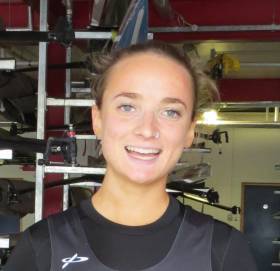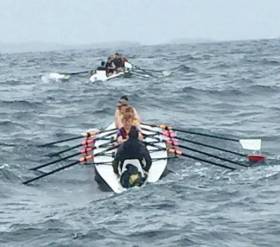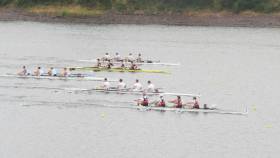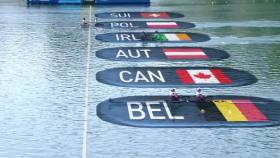Displaying items by tag: Skibbereen
Cremen and Fintan McCarthy Win at Skibbereen Regatta
#Rowing: Skibbereen had a one-two-three in the men's single sculls at their own regatta at the National Rowing Centre today. Gary O'Donovan, who was returning to racing after a hand injury, won his heat, but finished second to Fintan McCarthy in the final, with Aodhan Burns third. Paul O'Donovan was absent because of exam pressures.
UCC's Margaret Cremen won the women's single, while Holly Davis of Lee Valley, a junior 14 competitor, finished an excellent third. Sanita Puspure, whose boat had not made it back from the training camp in Italy, missed the event.
A tricky wind made conditions difficult, although this improved as the day went on.
The pairs titles were claimed by proven internationals: Mark O'Donovan and Shane O'Driscoll and Aifric Keogh and Monika Dukarska.
Brian Colsh of Sligo and Shauna Murtagh of Carrick-on-Shannon came out on top in the junior 18 single sculls at Portadown. The junior 16 eights titles, boys' and girls', went to Enniskillen RGS.
Puspure Honoured for World-Beating Year
#Rowing: The Afloat Rower of the Year 2018 is Sanita Puspure. The Old Collegians competitor proved herself the best single sculler in the world. She took silver at the World Cup regattas in Belgrade and Lucerne, running the defending champion, Jeannine Gmelin of Switzerland, extremely close (.23 of a second) in the Lucerne final.
Working with coach Dave McKenzie McGowan and high performance director Antonio Maurogiovanni, who set a very heavy training schedule, Puspure decided to miss the European Championships so that she could concentrate on the World Championships in Plovdiv in Bulgaria in September. She won her heat and semi-final, and then overcame bobbly conditions in the final. She established a clearwater lead. Gmelin came back at her in the third quarter; Puspure was not for catching. She won by two lengths of clear water.
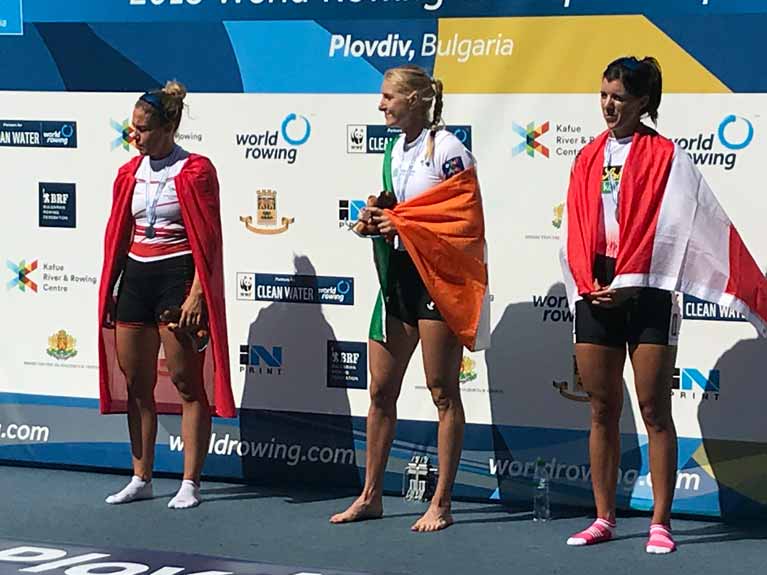 Sanita Puspure (centre) smiles after being presented with her gold medal at the World Championships. Jeannine Gmelin (silver) is on the left and Magdalena Lobnig (bronze) on the right. Photo: Liam Gorman
Sanita Puspure (centre) smiles after being presented with her gold medal at the World Championships. Jeannine Gmelin (silver) is on the left and Magdalena Lobnig (bronze) on the right. Photo: Liam Gorman
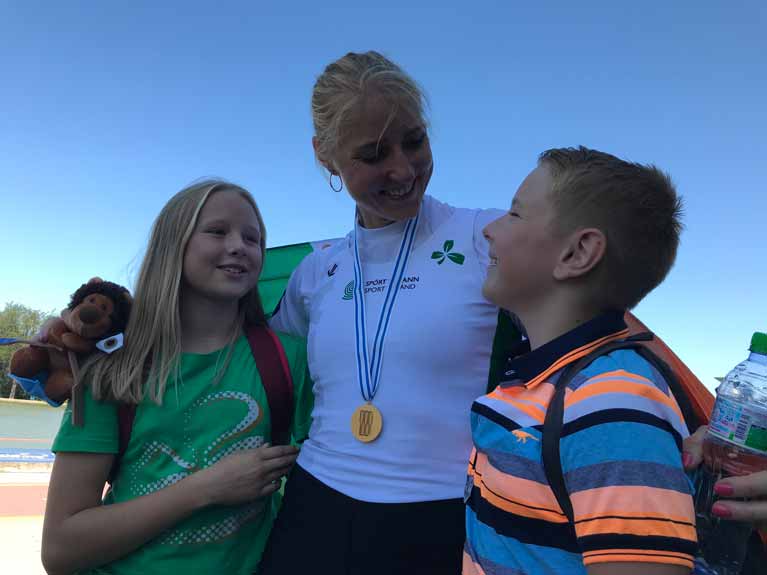 Sanita with Daniella and Patrick, her children, after winning World Championship gold. Photo: Liam Gorman
Sanita with Daniella and Patrick, her children, after winning World Championship gold. Photo: Liam Gorman
The win was a twin highlight at the end of a wonderful year. The O’Donovan brothers, Gary and Paul, won the lightweight double sculls gold in Plovdiv, making history as the first Ireland crew to take World Championship gold in an Olympic boat. They overcame terrible conditions and a poor lane draw to win in the quarter-final. This was succeeded by a semi-final in which they looked tired and could only take third. The final saw them in the unfavoured lane six for the final.
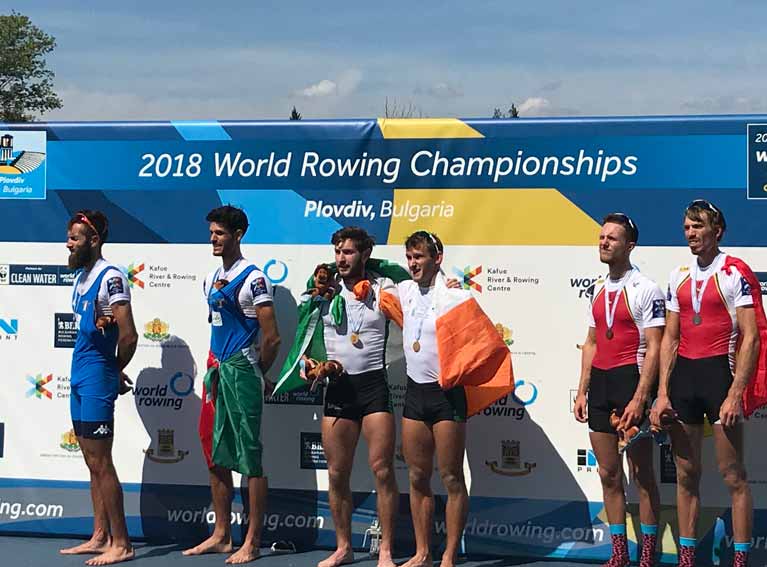 Ireland gold medalists Gary and Paul O'Donovan on the World Championship podium in Plovdiv, Bulgaria, with Italy (silver) and Belgium (bronze)
Ireland gold medalists Gary and Paul O'Donovan on the World Championship podium in Plovdiv, Bulgaria, with Italy (silver) and Belgium (bronze)
In a stirring race, the Skibbereen men saw off Italy. They would describe it as the best race they had ever rowed. They were outstanding in their steadiness, and over the second, third and fourth quarters they were the fastest crew. They took over the lead from Italy between 1200 and 1500 metres and rebuffed the charge by the men in blue to win by three-quarters of a length.
In a first for a women’s sweep crew from this island in an Olympic boat, Aifric Keogh and Emily Hegarty, the Ireland women’s pair, also reached an A Final at the World Championships. The World Under-23 Championships were also laden with success, with four A Finalists, gold for Shane Mulvaney and David O’Malley in the lightweight pair and silver for Miles Taylor, Niall Beggan, Ryan Ballantine and Andrew Goff in the lightweight quadruple.
Come the Fisa World Rowing Awards, Dominic Casey was honoured as the coach of the year.
In a season of success, Sanita Puspure is the Afloat Rower of the Year.
Afloat Rower of the Month awards: The judging panel is made up of Liam Gorman, rowing correspondent of The Irish Times, and David O'Brien, editor of Afloat magazine. Monthly awards for achievements during the year appeared on afloat.ie.
Boomer Best at Offshore Rowing Championships
#Rowing: Patrick Boomer won the single sculls at the Irish Offshore Championships at O’Carroll’s Cove near Caherdaniel in Kerry. Boomer represented Loughros Point in Donegal and hopes to go on to row for them at the World Coastal Rowing Championships in Canada in October.
John Whooley of Skibbereen won a title – for Arklow. The Corkman teamed up with Alan Goodison to take the men’s double.
Kerry club Killorglin won the women’s quadruple and Arklow the women’s double.
The final of the men’s quadruple, the women’s single and the mixed double will take place on Sunday as the wind made conditions unsuitable on Saturday.
Irish Offshore Championships, Kerry
Men
Double: Arklow (J Whooley, A Goodison) 20.17.
Single: Loughros Point, Donegal (P Boomer).
Women
Quadruple: Killorglin (E O’Donovan, A Tyther, K Boyle, R O’Donoghue; D Leahy) 22:48.
Double: Arklow (R Ireson, MA Kent).
#Rowing: Commercial won a stunningly-close race to take the men’s senior eights title at the Irish Rowing Championships today. NUIG/Queen’s had a slight lead ahead of a tightly-packed field early on, but Commercial moved at the 1,000 metres. They could not shake off UCD and the NUIG/Queen’s composite. UCD
finished really fast and almost – but not quite – caught Commercial, who were taking their third consecutive title.
The women’s senior eight went to Skibbereen. Their talented crew, stroked by Denise Walsh, had a clearwater lead over NUIG, who did not give up the fight but finished second. Skibbereen lifted their title haul to eight with the win.
Enniskillen started the evening session with two wins, in the women’s club eight, where Shandon pushed them, and the men’s junior pair, who were imperious in their victory.
The women’s junior coxed quadruple from Workmen’s was similarly impressive – the quality of junior rowing was a remarkable aspect of this regatta.
Another notable aspect was the proportion of wins which went to Cork clubs. Two of the last three titles did not leave the rebel county: UCC finished out their successful programme with a win in the men’s intermediate double through Ronan Byrne and Hugh Sutton, while Selma Bouanane took the last race of the event, the women’s intermediate single, for Fermoy.
Irish Rowing Championships, Day Three (Selected Results)
Men
Eight – Senior: 1 Commercial (S Mac Eoin, C Cunningham, L Cameron, N Beggan, P Moreau, F Groome, M Corcoran, C Dowling; cox: M Crockett) 5:43.18, 2 UCD 5:43.76, 3 NUIG/Queen’s 5:46.82.
Four – Club, coxed: UCC A 6:38.03.
Pair – Inter: Shandon A 6:56.07. Junior: Enniskillen 6:56.199.
Sculling, Double – Inter: UCC 6:32.59. Junior: Castleconnell (R O’Neill, J Desmond) 6:49.97.
Lightweight Single: Skibbereen (A Burns) 7:20.56.
Women
Eight – Senior: 1 Skibbereen (L Heaphy, O Hayes, M Piggott, A McCarthy, N Long, N Casey, A Casey, D Walsh; cox: A O’Neill) 6:28.42, 2 NUIG A 6:33.32, 3 Trinity 6:48.35. Club: Enniskillen 6:48.33.
Four – Inter, coxed: Cork 7:22.36.
Pair – Junior: Fermoy (E O’Reilly, G McGirr) 7:48.69.
Sculling, Quadruple – Junior: Workmen’s 7:01.06.
Single – Inter: Fermoy (S Bouanane) 8:03.25.
Lightweight Single: 1 Lee (M Cremen) 8:06.97
Cork Clubs Come to Fore at Irish Rowing Championships
#Rowing: UCC brought their title tally to three as they added the club coxed four to their club eights and intermediate single sculls pots at the Irish Rowing Championships today. The four was tested by four other crews coming to the line but broke free and won. The morning session on the Sunday was held in intermittent light rain.
Margaret Cremen won the women’s lightweight single sculls. The Lee woman looked dominant through much of the race, but as she approached the line she was hunted down by Orla Hayes of Skibbereen, who closed to just a few seconds on the line. Hayes’s clubmate, Aodhan Burns, left no doubts as to his intentions in the men’s lightweight single. He left the rest behind and won well.
The men’s intermediate pair gave Shandon a chance to demonstrate the depth of their talent pool. Stephen O’Sullivan and Colm Hennessy teamed up to win. The Castleconnell junior double of James Desmond and Rory O’Neill came under pressure from Lee in their win.
One of the closest races in the Championships so far came in the women’s intermediate four. Leaders Trinity were pipped on the line by Cork, whose winning margin was under a third of a second (.312).
Killorglin’s Anna Tyther and Rhiannon O’Donoghue gave Fermoy a test in the women’s junior pair. Gill McGirr and Eliza O’Reilly are an excellent crew, however, and held off their Kerry rivals.
Irish Rowing Championships, Day Three (Selected Results)
Men
Four – Club, coxed: UCC A 6:38.03.
Pair – Inter: Shandon A 6:56.07.
Sculling, Double – Junior: Castleconnell (R O’Neill, J Desmond) 6:49.97.
Lightweight Single: Skibbereen (A Burns) 7:20.56.
Women
Four – Inter, coxed: Cork 7:22.36.
Pair – Junior: Fermoy (E O’Reilly, G McGirr) 7:48.69.
Sculling, Lightweight Single: 1 Lee (M Cremen) 8:06.97.
Championship Records Tumble at National Rowing Centre
#Rowing: Records fell in race after race in the final Saturday session of the Irish Championships. The Skibbereen senior quadruple of Fintan McCarthy, Aodhan Burns, Kealan Mannix and Jake McCarthy smashed the Championship best of 5:59.10 as they won in 5:50.696.
The Shandon junior quadruple of Eoin Gaffney, Luke Hayes-Nally, Jack Dorney and Alex Byrne – all set to compete at the World Junior Championships – set a new time of 5:58.26. This beat the old Championship record of 6:07.97.
In both cases the crews were bettering times set by their own club.
Lisa Dilleen’s win in the women’s senior single scull was emphatic. The Cork Boat Club sculler set a Championship course record of 7:34.282, bettering Monika Dukarska’s time of 7:35.07.
Ronan Byrne of UCC took the intermediate single, under some pressure from Niall Beggan of Commercial. Byrne’s time of 6:55.898 bettered Kealan Mannix’s time of 7:03.51, set last year.
Enniskillen took the women’s junior eights, in 6:30.753, bettering their own time from last year of 6:36.24.
In the women’s senior pair, Aine McCarthy and Niamh Casey shattered the old Championship record of 7:23.78, setting a new time of 7:17.176.
Joan Poh of Neptune also won the club single sculls in a new record. The old figure was 8:09.22. Poh won in 8:06.13.
UCD continued their fine run in eights by adding the men’s novice title to the intermediate one.
Irish Championships, Day Two (Selected Results)
Men
Eight – Inter: UCD 5:43.70. Novice: UCD 6:03.599.
Four – Junior, coxed: Enniskillen 6:22.66.
Sculling, Quadruple – Senior: Skibbereen 5:50.696. Jun: 1 Shandon 5:58.26
Single – Inter: UCC (R Byrne) 6:55.898. Club: Carlow (F O’Driscoll) 7:25.3.
Women
Eight – Novice: Queen’s 7:04.49. Jun: Enniskillen 6:30.75.
Pair – Senior: Skibbereen 7:17.18.
Sculling, Double – Inter: Skibbereen 7:09.09. Single – Senior: Cork BC (L Dilleen) 7:34.28. Club: Neptune (J Poh) 8:06.1. Jun: Coleraine GS (M Curry) 7:53.46.
O'Donovans Tested by Skibbereen Twins at Cork Regatta
#Rowing: Paul O’Donovan and Gary O’Donovan were tested in the men’s double sculls by Jake and Fintan McCarthy at Cork Regatta today. The two Skibbereen crews fought it out down the course with the twins not letting the O’Donovan brothers build a clear-water lead. At the end the McCarthy’s pushed, and there was less than a length in it.
UCD’s four were impressive winners. The crew of Shane O’Connell, Andrew Goff, Shane Mulvaney and David O’Malley left Commercial behind.
The Skibbereen/Lee combination of Denise Walsh and Margaret Cremen were also in charge in the women’s double. Behind them the junior double from Workmen’s won a battle for second.
Cork Regatta, Day Two (Selected Results)
Men
Four – Div One: 1 UCD (S O’Connell, A Goff, S Mulvaney, D O’Malley; sen) 6:33.45, 2 Commercial (sen) 6:38.28, 3 Shandon (sen) 6:46.05. Four, coxed – Div Two: 1 UCC (club two) 7:00.73; 6 St Joseph’s 7:19.29. C Final: 3 St Michael’s (jun 16) 7:40.34.
Sculling, Double – Div One: 1 Skibbereen A (G O’Donovan, P O’Donovan; sen) 6:46.14, 2 Skibbereen B (sen) 6:47.68; 4 Queen’s (inter) 7:15.57. B Final: Castleconnell (jun 18A) 7:19.86. C Final: 5 Belfast RC (club one) 7:57.44.
Single – Div Two: 1 Kenmare (T Kelly; jun 16) 8:01.71, 2 New Ross (jun 18B) 8:03.67, 3 Workmen’s (club two) 8:04.995.
Women
Sculling, Double – Div One: 1 Skibbereen, Lee (M Cremen, D Walsh; sen) 7:42.97, 2 Workmen’s (jun 18A) 7:56.34, 3 Fermoy (inter) 7:57.45. B Final: 4 Fermoy Castleconnell (club one) 8:17.57.
#Rowing: Two strong senior composite crews took home the Division One quadruple titles as the action concluded late into the evening on the first day of Cork Regatta at the National Rowing Centre. The women’s final saw Margaret Cremen join Skibbereen’s Lydia Heaphy, Denise Walsh and Aoife Casey to good effect, and the men’s winners were the prospective Ireland Under-23 lightweight quad. Workmen’s and Shandon junior 18 crews were good runners up in the women’s and men’s races.
Cork Boat Club won the Division One men’s coxed four title, while Trinity took the women’s.
Cork Regatta, National Rowing Centre (Selected Results)
Men
Eight – Div Two: Neptune (club two) 6:22.95; 4 Trinity (nov) 6:34.32; 5 Col Iognaid (jun 16) 6:35.63; 6 Shandon (jun 18B) 6:43.79.
Four – Div One, coxed: Cork (inter) 6:34.299; 3 Enniskillen A (jun 18A) 6:39.299. C Final: 2 Neptune (club one) 6:48.37.
Pair – Div One: 1 UCD (S Mulvaney, D O’Malley; sen) 6:53.31, 2 Skibbereen (M O’Donovan, S O’Driscoll; sen) 6:59.98, 3 Enniskillen (jun 18A) 7:06.75; 6 Cork A (inter) 7:23.68. B Final: 6 Neptune A (club one) 7:24.50.
Sculling, Quadruple – Div One: 1 Tara, UCD, Commercial, UCC (sen) 6:00.93, 2 Shandon (jun 18) 6:10.96
Double – Div Two: CRCC (jun 18B) 7:06.99; 5 Cork A (jun 16) 7:15.37. B Final: Cappoquin (club two) 7:20.43
Single Sculls: 1 Skibbereen (P O’Donovan; sen) 6:59.73. B Final: UCC (H Sutton; lwt) 7:20.63. C Final: 1 Shandon (E Gaffney; jun 18A) 7:28.92; 2 Queen’s (N Hull; inter) 7:29.86
Women
Eight- Div Two: Trinity A (club two) 6:52.696; 6 Commercial (jun 16) 7:15.45. B Final: 1 Queen’s (nov) 7:19.09.
Four, coxed – Div One: 1 Trinity (inter) 7:25.63, 2 Commercial (sen) 7:30.06; 5 Shandon (club one) 7:46.78.
Pair – Div One: 1 Skibbereen (A McCarthy, N Casey; sen) 7:49.73; 4 Col Iognaid (Jun 18A) 8:07.86; Shandon (club one) 8:08.78. C Final: 4 Shandon (inter) 8:36.00.
Sculling, Quadruple – Div One: 1 Skibbereen/Lee 6:50.49; 2 Workmen’s (jun 18A) 7:05.596. Div Two: 1 Cork A (club two) 7:50.05; 3 Carlow (jun 16) 8:03.97. B Final: Carlow (jun 18B) 8:13.43; 4 Queen’s (nov) 8:25.47.
Double – Div Two: 1 Killorglin (jun 18B) 7:41.63, 2 New Ross (club two) 7:56.41, 3 Carlow (jun 16) 8:00.41
#Rowing: Skibbereen won three of the four Division One titles on offer in the first session of finals at Cork Regattat at the National Rowing Centre. However, the final of the men’s pair belonged to David O’Malley and Shane Mulvaney of UCD. They raced well in the hot weather and finished well clear of Skibbereen’s Shane O’Driscoll and Mark O’Donovan.
Gary O’Donovan followed his brother Paul O’Donovan over the line in the men’s single sculls, while Denise Walsh got the better of Cork’s Lisa Dilleen in the women’s single.
The women’s pair was won by Aine McCarthy and Niamh Casey of Skibbereen.
Cork Regatta, National Rowing Centre (Selected Results)
Men
Eight – Div Two: Neptune (club two) 6:22.95; 4 Trinity (nov) 6:34.32; 5 Col Iognaid (jun 16) 6:35.63; 6 Shandon (jun 18B) 6:43.79.
Pair – Div One: 1 UCD (S Mulvaney, D O’Malley; sen) 6:53.31, 2 Skibbereen (M O’Donovan, S O’Driscoll; sen) 6:59.98, 3 Enniskillen (jun 18A) 7:06.75; 6 Cork A (inter) 7:23.68. B Final: 6 Neptune A (club one) 7:24.50.
Single Sculls: 1 Skibbereen (P O’Donovan; sen) 6:59.73. B Final: UCC (H Sutton; lwt) 7:20.63. C Final: 1 Shandon (E Gaffney; jun 18A) 7:28.92; 2 Queen’s (N Hull; inter) 7:29.86
Women
Pair – Div One: 1 Skibbereen (A McCarthy, N Casey; sen) 7:49.73; 4 Col Iognaid (Jun 18A) 8:07.86; Shandon (club one) 8:08.78. C Final: 4 Shandon (inter) 8:36.00.
Sculling, Quadruple – Div Two: 1 Cork A (club two) 7:50.05; 3 Carlow (jun 16) 8:03.97. B Final: Carlow (jun 18B) 8:13.43; 4 Queen’s (nov) 8:25.47.
#Rowing: Ireland’s Paul O’Donovan and Gary O’Donovan took a bronze medal at the World Cup Regatta in Belgrade this morning. The A Final of the lightweight double was tight and had an exciting finish. Ireland started well, but Poland took the lead and held it through to the 1500 metres mark, with Ireland, Austria and Belgium exerting pressure. The Irish moved in the final 500 metres – but so did Poland. Jerzy Kowalski and Milosz Jankowski drove for the line and won. Belgium caught the Irish and passed them on the line. The took the silver by one hundredth of a second.
World Cup Regatta, Belgrade, Day Three (Irish interest)
Men
Lightweight Double Sculls – A Final: 1 Poland 6:13.04, 2 Belgium 6:14.09, 3 (G O’Donovan, P O’Donovan) 6:14.10; 4 Canada Two 6:17.27, 5 Austria 6:17.32, 6 Switzerland Two 6:23.87.


























